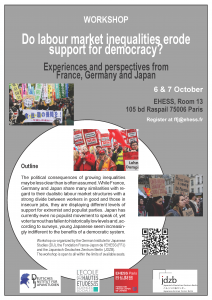イベント&アクティビティ
Evolution and Transformations of Japan’s Multilateral Diplomacy

From a purely geopolitical point of view in international relations theory, Japan could focus on its bilateral relations with the United States to ensure its national security and neglect multilateral diplomacy. However, Japan shows a remarkably active behavior in multilateral arenas, such as the United Nations: as the second largest financial contributor to the United Nations regular budget, as the most frequently elected non-permanent member of the United Nations Security Council, and in its commitment to particular issues such as Human Security (Shin’yo 2017).
Since geopolitical reasoning cannot sufficiently explain Japan’s international actions and multilateral commitment, this research aims for a more eclectic approach by adopting a constructivist perspective. Taking into account recognition, identity, norms and other social factors contributes to a better understanding of Japanese multilateral diplomacy (Kratochwil 2011). The research project looks back at 60 years of Japanese UN membership. Of particular interest are the notions that are central to Japanese diplomacy and their interpretation by Japanese actors, constructing a certain image of Japan and its diplomacy.
Prolonging Youthfulness: An Investigation of the bimajo Phenomenon in Japan
For the past five, six years, bimajo (美魔女) has come into media attention in Japan. Bimajo are women in their 35 and above, who look much younger than their actual age. They put on nice make up, their hair is nicely arranged, and they are very fashionable, too. On top of that, they maintain their skin very well, hardly have wrinkles and age spots, and keep their body fit.
Bimajo is an extreme example of women who want to stay young. More generally, this research has observed that many Japanese women around the age of 40, regardless of their marital status and occupation, try to be young; not only by their appearance but they also try to make the way they speak, and tone of their voice appear younger. The presentation will also investigate the social expectations of being young towards Japanese women through textual analysis of media discourse as well as an ethnographic approach: interacting with Japanese women in their 30s and 40s.
Do labour market inequalities erode support for democracy? Experiences and perspectives from France, Germany and Japan

For decades, many policymakers and international organisations such as OECD and the IMF, have emphasised the need of structural, especially labour market reforms to improve competitiveness. While many arguments of this debate are still present today (e.g. in the 2017 French election campaign), it is now widely accepted that growing social inequalities have contributed to an increase in income inequality and that rising inequalities in the labour market could be a major factor behind feelings of political marginalisation and alienation, vote abstention, support for extremist and/or anti-establishment parties and growing distrust in parties and democratic institutions.
This workshop seeks to investigate links between labour market inequalities and falling support for and trust in democracy by bringing together scholars and experts from France, Germany and Japan.
書籍共同展示:
没・90年 芥川龍之介

2017年は大正時代の文豪、芥川龍之介の没後90年に当たります。
国際文化会館、日仏会館、ドイツ日本研究所の各図書室では、芥川作品の翻訳書や研究書を展示します。
この機会に、数々の名作の英語版、フランス語版、ドイツ語版をぜひご覧ください。
VSJF Annual Conference 2017: “Rural Japan Revisited: Autonomy and Heteronomy in the Peripheries”

We would like to draw your attention to this year’s annual meeting of the German Association for Social Science Research on Japan, which takes place in Vienna. Its main focus is rural Japan. DIJ collaborated with the Department of East Asian Studies – Japanese Studies at Vienna University in the organization of the conference. We will present and discuss our research on the future of local communities in Japan on two panels.
For more information and if you want to register, please click here.
Changing dynamics of multilevel democracy in Japan

Since the 1990s, local democracy and representation in Japan have been changing. Political reforms at the national level, decentralization, reduced clientelism, and broader socio-economic challenges such as depopulation have transformed the roles of local legislatures and executives. These changes have not least affected important national policies.
The talk will analyze overall trends in the “quality” of local democracy in terms of some indicators of responsiveness, accountability and participation in local representation at municipal and prefectural level. It will further discuss how changes in local representation and local party organizations have affected national processes regarding public works, energy, and security. The talk concludes with reflections on how aggravated regional inequality will affect decentralization and the quality of local and national democracy in the near future.
Transcultural Potentials of Japanese Fan Work: First Field Results

Examining the interaction of fans with cultural texts, fan studies contribute to the analysis of power structures in the mediatised world. So far, fan studies mainly focus on Anglophone fan cultures. Therefore, fan practices in East Asia, such as dōjinshi (self-published magazines that are usually exchanged at specialized events), remain in the periphery of the academic discourse. Academic work on the transcultural potential of fan cultures as conducted by scholars such as Bertha Chin, Lori Morimoto and Sandra Annett suggests that creative fan work is a global phenomenon worthy of further examination.
In this presentation, I give an overview of the field study that I conducted through participant observation at fan events, and qualitative content analysis of semi-structured interviews with fan artists.
Picture: CC BY 2.0 | Flickr/Guilhem Vellut
Migration and East Asian Societies: Comparative Perspectives
To date, theories and conceptualization of human mobility are still predominantly developed from a perspective that prioritizes the study of movement from poorer to richer countries (i.e., South-to-North). Frameworks for conceptualizing other directions of movement such as South-to-South, North-to-South or within and across regions are scarce, despite that these movements constitute a major part of global human mobility. Systematic differences in migration legislation, public opinion toward migrants, migrants’ fields of employment, and power relations between migrants and groups in receiving societies (which are mostly non-Western, developing countries) compel us to doubt the global generalizability of conventional migration models. This workshop aims to contribute to problematizing and advancing scholarship on migration/ human mobility concerning non-Western countries.




 Open Access
Open Access
